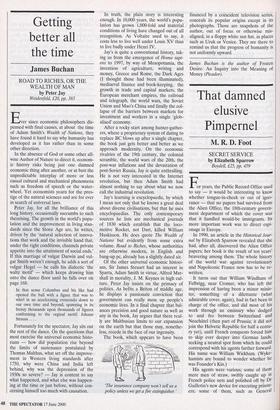Getting better all the time
James Buchan
ROAD TO RICHES, OR THE WEALTH OF MAN by Peter Jay Weidenfeld, .£20, pp. 383 Ever since economic philosophers dis- pensed with final causes, at about the time of Adam Smith's Wealth of Nations, they have found it hard to say why humanity has developed as it has rather than in some other direction.
In the absence of God or some other all- wise Author of Nature to direct it, econom- ic history risks being just one damned economic thing after another, or at best the unpredictable interplay of more or less casual cultural and mechanical phenomena such as freedom of speech or the water- wheel. Yet economists yearn for the pres- tige of the natural sciences and are for ever in search of universal laws.
Peter Jay, for all the brilliance of this long history, occasionally succumbs to such theorising. The growth in the world's popu- lation and the improvement in living stan- dards since the Stone Age are, he writes, driven by the 'natural selection of innova- tions that work and the invisible hand that, under the right conditions, channels private appetite into the attainment of social ends.' If this marriage of vulgar Darwin and vul- gar Smith weren't enough, he adds a sort of vulgar Hegel — he calls his dialectic 'the waltz motif — which keeps drawing him onto the dance floor until he falls over tin page 168: In that sense Columbus and his like had opened the ball with a figure that was to whirl in an accelerating crescendo down to our own time and beyond, spawning in its frenzy thousands upon thousands of figures conforming to the orginal motif. Johann Strauss ....
Fortunately for the spectator, Jay sits out the rest of the dance. On the questions that most exercise the universal economic histo- rians — how did population rise beyond the limits of sustenance postulated by Thomas Malthus, what set off the improve- ment in Western living standards after 1750, why were China and India left behind, why was the depression of the 1930s so severe? — Jay is content to say what happened, and what else was happen- ing at the time or just before, without con- cerning himself too much with causation. In truth, the plain story is interesting enough. In 10,000 years, the world's popu- lation has grown 1,000-fold and material conditions of living have changed out of all recognition. As Voltaire used to say, it costs less to live well under Louis XV than to live badly under Henri IV.
Jay's is quite a conventional history, tak- ing us from the emergence of Homo sapi- ens to 1997, by way of Mesopotamia, the invention of agriculture, writing and money, Greece and Rome, the Dark Ages (I thought those had been illuminated), mediaeval finance and book-keeping, the growth in trade and capital markets, the European merchant empires, the railroad and telegraph, the world wars, the Soviet Union and Mao's China and finally the col- lapse of the barriers between markets for investment and workers in a single 'glob- alised' economy.
After a rocky start among hunter-gather- ers, where a proprietary system of dating to replace BC blows up after a single chapter, the book just gets better and better as we approach modernity. On the economic rivalries of the 19th century, the colonial scramble, the world wars of the 20th, the post-war inflations and the devastation of post-Soviet Russia, Jay is quite enthralling. He is not very interested in the Internet revolution, but then Adam Smith had almost nothing to say about what we now call the industrial revolution.
Jay's learning is encyclopaedic, by which I mean not only that he knows a great deal about diverse civilisations, but that he uses encyclopaedias. The only contemporary sources he lists are mechanical journals of 1830 which establish that the loco- motive Rocket, not Dart, killed William Huskisson. He does quote The Wealth of Nations but evidently from some extra volume. Road to Riches, whose authorities are otherwise modern, in English and bang-up pc, already has a slightly dated air.
Of the other universal economic histori- ans, Sir James Steuart had an interest in Sparta, Adam Smith in virtue, Alfred Mar- shall in morality, J. M. Keynes in high cul- ture. Peter Jay insists on the primacy of politics. As befits a Briton of middle age, he displays a passionate conviction that government can really mess up people's economic lives. In a final chapter that bal- ances precision and good nature as well as any in the book, Jay argues that there real- ly are Malthusian limits to our expansion on the earth but that those may, nonethe- less, recede in the face of our ingenuity.
The book, which appears to have been 'The insurance company won't sell us a policy unless we get a fire extinguisher.' financed by a coincident television series, conceals its popular origins except in its photographs. Those are snapshots of the author, out of focus or otherwise mis- aligned, in a floppy white sun hat, in places such as Uruk or Venice. They are there to remind us that the progress of humanity is not uniformly upward.
James Buchan is the author of Frozen Desire: An Inquiry into the Meaning of Money (Picador).










































































 Previous page
Previous page